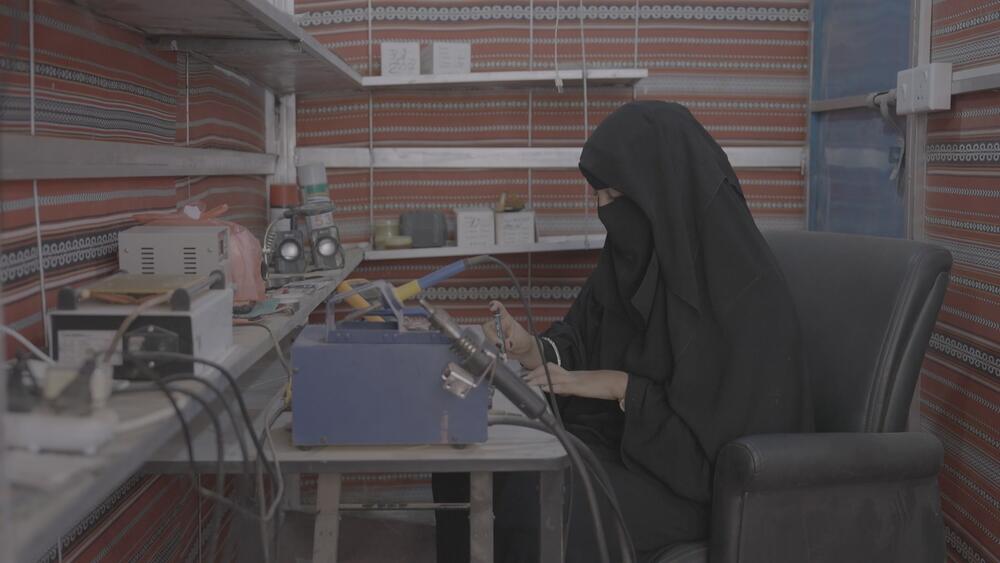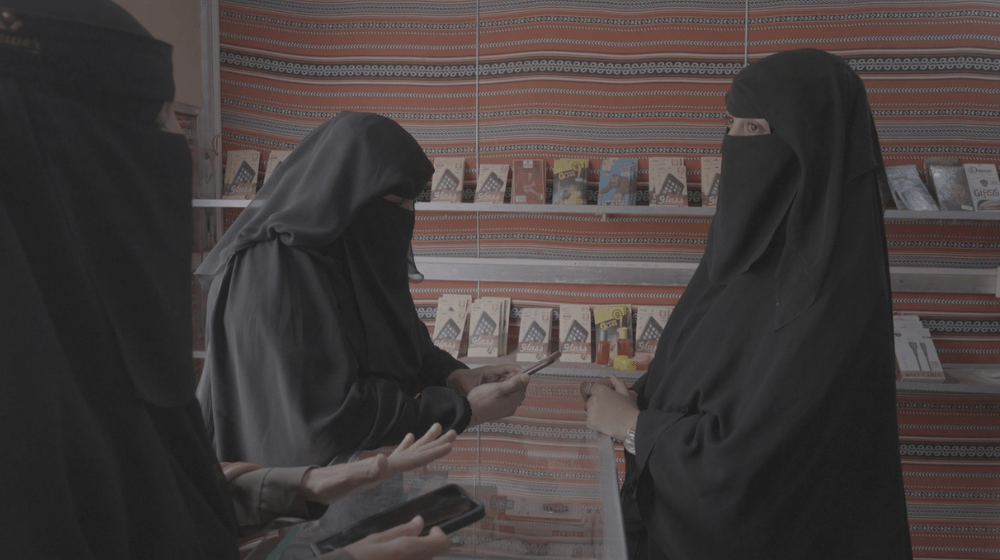MARIB/TAIZZ, Yemen – At just 26 years old, Abeer has already lived through nearly a decade of war in Yemen. She fled her home in Dhamar in 2016, walking and hitchhiking for eight hours with her husband and young children to seek refuge in the neighbouring governorate of Marib.
The displacement had a devastating impact on her family's finances. “I was determined to contribute,” Abeer told UNFPA, the United Nations sexual and reproductive health agency. But due to the upheaval, she left school at 16 and was married at 17. “Finding work was challenging as I lacked skills or qualifications.”
Her sister was already in Marib and encouraged her to join a UNFPA-supported safe space for women and girls that offered counselling, vocational courses, and a step towards a brighter future.
Abeer took a course in fixing mobile phones, which sparked a curiosity that would lead her to open her own repair shop just a month after she started taking classes. Its name: Aman Tech, or ‘Safety Tech.’
“It was a turning point for women in the area,” said Abeer. “With the prevalence of cyber extortion, many women were afraid to seek repairs for their devices.”
She had heard multiple accounts of girls having their phones hacked while their devices were being repaired, only to find their private photos posted online – leading to harassment and abuse.
“The horrifying stories of electronic blackmail had made me hesitant to seek repairs,” said Umm Ali*, a regular customer. “But Abeer's reputation for trustworthiness and privacy gave me peace of mind.”

Although it was uncommon for women in her region to work in technology, and she faced travel restrictions as well as pushback from other shopowners, she persevered. “My success challenged traditional gender roles and inspired other women to explore unconventional paths.”
Demand for her services has soared, and she hopes to expand her business, training more women so they can provide for themselves. “I wanted to create a supportive environment where women can thrive and contribute to the community's development,” she explained.
Acts of digital violence
Technology-facilitated gender-based violence can cause psychological and even physical harm. The abuse can take many forms, including cyber extortion, which involves blackmail by threatening to publish private material; image-based abuse, in which intimate photos are shared without consent; and doxxing, whereby personal information is made public.
In the city of Taizz, on the other side of Yemen from Abeer, 20-year-old Mona* had shared some personal photos with her best friend, trusting no one else would ever see them. But her trust soon turned to horror when she received a text message from an unknown number, demanding money not to disseminate them further.
“In that moment, I wished I were dead and not living through this. I imagined what would happen if my father found out. Surely, he would kill me.”
Mona paid the blackmailer, but the threats soon resumed with demands for more money – which she didn’t have.
“He said he would send the pictures to my father and share them on my Facebook page. I was intensely distressed,” she told UNFPA. Unfortunately for Mona, her abuser followed through on his threats.
“For my family, it was shocking,” she told UNFPA. “They questioned me, then they physically abused me. They even threatened to kill me.”
A cycle of abuse
Mona had confided in a cousin, who intervened on her behalf. “She told them I hadn't done anything wrong. They believed her and understood what had happened.”
But her punishment didn’t end there. “My family imposed strict rules, taking my mobile phone and preventing me from completing my studies.” The harsh treatment took a further toll on Mona as her physical and mental health deteriorated.
![wo women in black niqabs speak across a desk with a laptop and filing tray on it]](https://www.unfpa.org/sites/default/files/inline-images/Untitled%20design%20%2814%29.png)
Since the start of 2024, nearly 250,000 people in Yemen have received assistance through a UNFPA-supported hotline and in person at mental health centres. Credit: UNFPA Yemen / Ahmed Al Majidi
“I wanted to help her, so I researched extensively among doctors and sheikhs,” her mother said, “but without any result.”
Mental healthcare in Yemen is scarce, all the more so because psychological illness is highly stigmatized. The protracted conflict has left some 7 million people in need of psychological treatment and support, but only 120,000 have uninterrupted access to these services.
Just when she was about to lose hope, a neighbour told Mona’s mother about a facility that dealt with similar cases. “I immediately took her there.”
Comprehensive care
Mona arrived at a UNFPA-supported mental health centre, where she received psychological first aid, a course of medication and psychotherapy.
“I had lost trust in everyone,” she said. “The extortion left a scar in my heart and memory, but after the sessions I noticed a change in my mindset. I became optimistic and my self-confidence returned.”
UNFPA has established seven psychological support centres across Yemen, with funding from the European Union, Norway and the United States. Since the start of 2024, nearly 250,000 people have received support through a hotline and in person at the centres – over three quarters of whom are survivors of gender-based violence.
“I’m no longer the one who doubts herself,” said Mona. “I am grateful to this centre – I hope these projects continue, because women need them.”
*Name changed for privacy and protection



